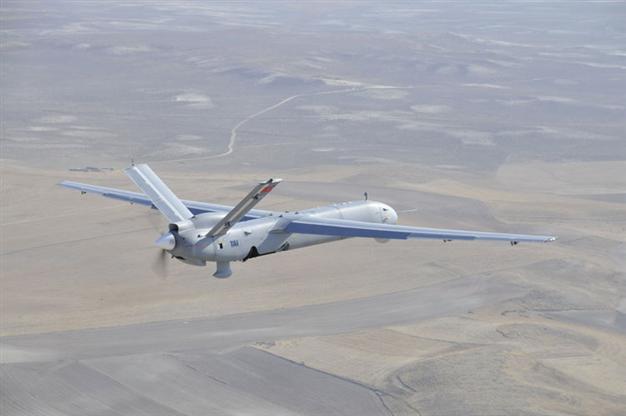Turkish defense companies a casualty of Egyptian coup?
Burak BEKDİL

ANKA unmanned aerial vehicles built by Turkish Aerospace Industries (TAI), which had drawn interst from Egypt earlier, is seen in this file photo. DHA photo
Turkey’s defense industry bureaucracy and weapon system manufacturers have meticulously penetrated the emerging Egyptian market since late 2011, hoping for multiple contracts in line with excellent political relations, but the coup in Cairo may jeopardize future deals.Procurement officials admit that as the alliance with ousted President Mohamed Morsi drags into a period of uncertainty many of the potential defense contracts could also be obscured. “It is true that the political relations with Egypt worked as a lubricant for defense deals,” a senior official said. “Honestly, I am not sure how we will progress under the circumstances.”
An aviation company executive said he hoped negotiations for possible deals would progress normally although he also expressed suspicion. “Egypt was a looming market for a wide range of Turkish defense systems,” he said. “It is difficult to judge how much of their interest in the Turkish industry was politically motivated. We hope [Turkey’s] political relations with the new regime don’t turn too tense.”
Prime Minister Recep Tayyip Erdoğan on Friday condemned the military intervention that toppled Egypt’s Islamist president, Mohamed Morsi, as an enemy of democracy, and chastised the West for failing to brand the ouster a coup. “No matter where they are... coups are bad,” Erdoğan said in televised remarks. “Coups are clearly enemies of democracy.” Erdoğan also lashed out at the West for shying away from calling the military intervention a coup, while welcoming the African Union’s decision to suspend Egypt over the army’s actions.
An Arab diplomat in Ankara said he expected “difficult times” in Turkish-Egyptian relations, which may disrupt economic relations too, unless Ankara and Cairo prefer to pursue a pragmatic line. “Apparently Erdoğan is deeply annoyed by the intervention, and he does not hide it. I don’t think he could easily switch to a friendly track with Cairo before democracy is restored. Yet there is always a chance that pragmatism wins over hostility,” he said.
Ironically, in May Turkey granted Egypt a $250 million loan to finance Turkish-Egyptian joint defense projects. The loan, the first of its kind, intends to boost defense cooperation and Turkish defense exports to Egypt.
Earlier, Egypt expressed an interest in buying the new ANKA Medium Altitude Long Endurance (MALE) unmanned aerial vehicles built by Turkish Aerospace Industries (TAI). Egypt was one of the pioneers in unmanned aerial systems, fielding the Teledyne Ryan Model 324 Scarab high speed drone and SkyEye tactical UAVs since the early 1980s. The addition of a MALE platform will fulfill the gap offering better persistence, improved imagery and multi-payload capacity.
The potential sale of six to 10 ANKA systems to Egypt was discussed during Erdoğan’s visit to Cairo last November. The ANKA is currently undergoing flight tests.
In a separate deal, Ankara had approved the sale to Egypt of six multi-role tactical platforms, MRTP-20 “fast-intervention crafts,” produced by the privately-owned shipyards Yonca-Onuk. Under this deal, three boats would be constructed in Istanbul and the others in Egypt’s Alexandria shipyard under Turkish license.
A defense industry source said other potential contracts with Egypt could include various models of armored vehicles, corvettes, basic trainer aircraft and, in the longer run, attack helicopters Turkey is building in partnership with the Italian-British AgustaWestland as well as utility helicopters TAI will jointly produce with U.S. Sikorsky.
















